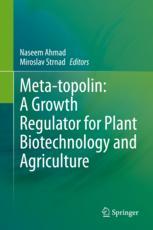Plant tissue culture (PTC) technology has gained unassailable success for its various commercial and research applications in plant sciences. Plant growth regulators (PGRs) are an essential part of any plant tissue culture intervention for propagation or modification of plants. A wide range of PGRs are available, including aromatic compounds that show cytokinin activities, promote cell division and micro-propagation, viz. kinetin, N6-benzyladenine and topolins. Topolins are naturally occurring aromatic compounds that have gained popularity as an effective alternative for other frequently used cytokinins in in vitro culture of plants. Among them, meta-topolin [6-(3-hydroxybenzlyamino) purine] is the most popular and its use in plant tissue culture has amplified swiftly. During the last few decades, there have been numerous reports highlighting the effectiveness of meta-topolin in micropropagation and alleviation of various physiological disorders, rooting and acclimatization of tissue culture raised plants.





